Environment - ENA English
Environment
Horn of Africa to be Wetter Than Usual from May to July, says ICPAC
Apr 29, 2025 34
Addis Ababa, April 29, 2025 (ENA)— Most parts of the Horn of Africa are expected to be wetter than usual between May and July 2025, the Climate Prediction and Applications Center (ICPAC) of the Intergovernmental Authority on Development (IGAD), an East African bloc, said Tuesday in its latest forecast. ICPAC said the wetter-than-normal conditions would affect most countries in the region, including Kenya, Somalia, southern Ethiopia, Uganda, eastern South Sudan, Rwanda, and Burundi. Only a few areas, including northern Ethiopia, western South Sudan, and northeastern Tanzania, are expected to experience drier-than-usual conditions, it said. "The corresponding seasonal temperatures are expected to be warmer than usual," ICPAC noted, adding that temperatures could exceed 32 degrees Celsius in some countries. According to ICPAC, the Horn of Africa recorded below-average rainfall between March and May. Typically, the region receives heavy rains during this period, but the pattern has now shifted to between May and July. Climate change has disrupted this trend, leaving the region grappling with extreme and unpredictable weather, including frequent rains, it added. The resulting challenges could further exacerbate food insecurity in the region, where at least 73 million people are already affected.
Nigerian President Urges World Leaders to Address Global Climate Crisis
Apr 25, 2025 603
Addis Ababa, April 25, 2025 (ENA)—Nigerian President Bola Tinubu has called on world leaders to demonstrate unity, courage, and sustained commitment in addressing the worsening global climate crisis. Addressing a high-level virtual dialogue on Wednesday, Tinubu reaffirmed Nigeria's dedication to forging a paradigm shift in which climate action and economic growth advance together. "The global climate emergency demands our collective, courageous, and sustained leadership," said Tinubu. "For Nigeria, the urgency of this moment is clear: we view climate action not as a cost to development, but as a strategic imperative." The event was co-organized by United Nations Secretary-General Antonio Guterres and Brazilian President Luiz Inacio Lula da Silva to accelerate global climate ambition ahead of COP30, which Brazil will host in November. Tinubu outlined Nigeria's Energy Transition Plan as a bold, pragmatic roadmap for reaching net-zero emissions by 2060. The plan targets five core sectors, including power, cooking, transportation, oil and gas, and industry, with a financing need of over 410 billion U.S. dollars. Highlighting Nigeria's role as an anchor country in the Mission 300 initiative, implemented in partnership with the World Bank and the African Development Bank, Tinubu noted that the initiative aimed to deliver electricity to 300 million Africans by 2030. He also recalled his participation in the Dar es Salaam Declaration earlier this year and Nigeria's presentation of its National Energy Compact, which outlines reform commitments, investment opportunities, and measurable targets to expand clean energy access and clean cooking solutions. "We are working to position Nigeria as a premier destination for climate-smart investment through the development of a Global Climate Change Investment Fund, which will serve as a platform to blend public and private capital, de-risk green infrastructure, and finance clean energy solutions at scale," Tinubu said. He added that the fund will support key national priorities such as green industrial hubs, e-mobility infrastructure, regenerative agriculture, and renewable energy mini-grids for underserved communities, Xinhua reported.
World Leaders Rally for ‘Full-speed’ Climate Action Ahead of COP30G20
Apr 24, 2025 1155
Addis Ababa, April 24, 2025 (ENA) – At a high-stakes virtual summit on Wednesday, UN Secretary-General António Guterres and Brazilian President Luiz Inácio Lula da Silva brought together 17 national leaders from major economies and climate-vulnerable countries. The goal was to accelerate global climate ambition ahead of COP30, which will be hosted in Brazil. The meeting was part of a joint mobilization strategy by the two leaders to strengthen global action under the Paris Agreement and build momentum for stronger national climate plans to be announced in 2025. The two-hour session held behind closed doors included China, the European Union, the African Union, the Association of Southeast Asian Nations, and small island developing States. Guterres described it as one of the most diverse meetings of national leaders focused exclusively on climate for some time, carrying a powerful unifying message. “As we heard today, the world is moving forward. Full-speed ahead. No group or government can stop the clean energy revolution”, he declared at a press briefing afterwards. He said many leaders pledged to deliver ambitious new climate plans, formally known as National Determined Contributions (NDCs), as soon as possible in what he called a “strong message of hope”. Guterres announced that President Xi Jinping confirmed during the meeting that China’s updated NDCs would cover all economic sectors and all greenhouse gases — a clarification he described as “extremely important” for climate action. He added that these pledges provide a vital opportunity to chart a bold path for the next decade and most importantly, help speed up a just transition away from fossil fuels to renewables. Renewable energy production is “the economic opportunity of the century,” he said, describing it as the “pathway out of climate hell.” “The clean energy sector is booming – creating jobs and boosting competitiveness and growth worldwide…Science is on our side and economics have shifted.” The UN chief noted that prices for renewables have fallen dramatically, offering “the surest route to energy sovereignty and security, ending dependence on volatile and expensive fossil fuel imports.” Since the 2015 Paris Agreement, global projections for warming have declined, from over 4°C this century to 2.6°C if current plans are implemented. But that still falls short of limiting temperature rise to 1.5°C above pre-industrial levels – the goal agreed in Paris by nations and endorsed by climate scientists. The Secretary-General urged leaders to submit national plans that align with that target, cover all greenhouse gases and sectors, and signal a full commitment to achieving net zero emissions by 2050. Guterres underscored the need to direct far more support to developing countries, which face the most severe impacts of climate change despite contributing the least to global emissions. “Africa and other parts of the developing world are experiencing faster warming – and the Pacific islands are seeing faster sea-level rise – even while the global average itself is accelerating,” he said. He called on countries to deliver a credible roadmap to mobilize 1.3 trillion USD per year for developing nations by 2035, double adaptation finance to 40 billion USD this year, and increase contributions to the new Loss and Damage Fund created at COP28. The Secretary-General also announced a high-level UN event in September – just weeks ahead of COP30 – to assess progress on climate plans and finance. The message was clear, according to Guterres. “We cannot, must not, and will not let up on climate action.”
Botswana Launches 5-year Anti-poaching Strategy to Combat Wildlife Crime
Apr 24, 2025 1193
Addis Ababa, April 24, 2025 (ENA) -- Botswana on Wednesday launched a five-year national anti-poaching strategy to address wildlife crime and promote biodiversity conservation while balancing sustainable livelihoods and land use. Speaking during the launch of the National Anti-Poaching Strategy in Gaborone, the capital of Botswana, Botswanan Minister of Environment and Tourism Wynter Mmolotsi said the strategy underscores Botswana's commitment to tackling illegal wildlife trade, now recognized as a global organized crime driven by demand for ivory, rhino horn, pangolin scales, and other wildlife trophies. Poaching and illegal wildlife trade are no longer just local or regional concerns, but have evolved into an organized and lucrative global problem, Mmolotsi said, emphasizing that illegal wildlife trafficking requires regional collaboration and coordinated international efforts. Funded by the Global Environment Facility and supported by the United Nations Development Program (UNDP), the strategy, which involves a funding of 26 million Botswanan pula (about 1.9 million USD), targets poaching threats to species like lions, leopards, cheetahs, rhinos and elephants. It prioritizes coordination among law enforcement agencies, integrated land-use planning, sustainable land management, and community involvement, recognizing local populations near protected areas as vital partners in conservation. UNDP Botswana Resident Representative Balazs Horvath stressed that empowering communities is critical to sustaining anti-poaching efforts and safeguarding ecosystems.
P4G Summit Reaches Agreement to Boost Sustainable, People-centred Green Transitions
Apr 18, 2025 2349
Addis Ababa, April 18, 2025 (ENA) -- The fourth Partnership for Green Growth and the Global Goals 2030 (P4G) Summit was a productive event with practical ideas and discussions on a sustainable, people-centred green transition, said Vietnamese Prime Minister Phạm Minh Chính. He was speaking at the closing ceremony of the P4G Summit in Hà Nội that brought together more than 40 countries and international organizations, including Prime Minister of Ethiopia Abiy Ahmed, Prime Minister of Laos, Sonexay Siphandone, and the Deputy Prime Minister of Cambodia, Neth Savoeun, and the Deputy Secretary-General of the United Nations, Amina J. Mohammed. In his speech PM Chính said “We reached a common understanding that green transition is an inevitable journey, an objective requirement, a strategic choice and a top priority for successfully achieving sustainable development goals,” he said, adding that this process requires global, multi-stakeholder collaboration among governments, businesses, communities and individuals, to ensure inclusive and equitable growth.” Many insightful opinions, valuable lessons, inspiring stories and breakthrough initiatives were shared during the summit’s discussions, alongside numerous practical activities, such as an exhibition of green products and solutions, and a business networking session. Expressing gratitude towards the collective efforts that were put into the success of the summit, PM Chính underscored the five agreements from the event. The first was a consensus on mobilizing financial resources to promote green transition and sustainable development, including public-private partnership models and innovative financial policies. Delegates also agreed on encouraging research and development of green technology solutions and increasing investment in innovation and start-up ecosystems. This is expected to facilitate the access of small and medium-sized enterprises (SMEs) to the necessary resources and support. Another consensus focused on sustainably transforming agricultural and food systems, which ensures food and nutritional security while playing a crucial role in environmental protection and sustainable development. There was also alignment on the development of a highly-skilled workforce, especially in science, technology and innovation. Delegates underlined the importance of ensuring equitable access to education, expanding job opportunities and addressing social inequalities. The summit also saw a shared commitment to effective and environmentally sustainable energy transition, especially in terms of cooperation in technology development and sharing, preferential loans for renewable energy projects, construction of essential infrastructure for energy transition and greater involvement from the private sector on the matter. “These areas of consensus reflect a shared mindset, understanding, shared responsibility, solidarity that stressed multilateral cooperation for collective actions and achievements,” said PM Chính. “Let us embrace the spirit of unity, international cooperation and resources connection based on a global, people-centred and inclusive approach that balances benefits and shares risks.” The success of the fourth P4G Summit demonstrated the value of multilateral cooperation in advancing green transformation and sustainable development, he added. “I earnestly call upon nations, organisations and businesses to strengthen their coordination with P4G members. Let us work together, contribute responsibly to a greener future for our world. Let us turn commitments into action, ideas into tangible projects and shared goals into determined implementation and pave the way for a sustainable and prosperous future for all nations, peoples and individuals,” said PM Chính. At the closing ceremony, the Vietnamese PM officially handed over the role of host for the P4G Summit to his Ethiopian counterpart Abiy Ahmed. PM Chính extended his best wishes to Ethiopia for a successful hosting of the P4G Summit in 2027, expressing hope that the country will continue to uphold the cooperation spirit and significance of P4G in the footsteps of the successful summits held in Denmark, South Korea, Colombia, and Việt Nam. Following a wide range of practical and meaningful activities to promote green transition and sustainable growth, P4G leaders reached a consensus to adopt two key declarations from the summit. They are the Hà Nội Declaration on Sustainable and People-centred Green Transition, and the Declaration on Strengthening Multilateral and Institutional Partnerships to Promote Green Transition and Sustainable Development.
P4G Rallying Point of Collectivism to Accelerate Green Growth, Foster Innovative Partnerships: PM Abiy
Apr 18, 2025 4124
Addis Ababa, April 18, 2025 (POA) --- Partnership for Green Growth and the Global Goals 2030 (P4G) Summit has been a rallying point for our collectivism to accelerate green growth, foster innovative partnerships and deliver on the promise of the Sustainable Development Goals, Ethiopia’s Prime Minister Abiy Ahmed underscored. Prime Minister Abiy expressed gratitude for receiving the torch accrediting Ethiopia as the host of the 5th Summit of the Alliance for Green Growth and Global Goals 2030 (P4G) in 2027. The premier said in a speech delivered at the conclusion of 4th P4G Summit in Vietnam, Hanoi on Thursday, that “We embrace this opportunity with determination and unwavering commitment to build on the inspiring legacy of Vietnam, Colombia, Denmark and the Republic of Korea. Guided by p4G's core principles of partnership, innovation, inclusivity and action,” the premier affirmed. Ethiopia's 2027 summit will spotlight green industrialization, climate resilience agriculture and the empowerment of youth and women as essential agents of change in the green transition, Prime Minister Abiy noted. He extended Ethiopia’s profound gratitude to the government and people of the Socialist Republic of Vietnam for their warm hospitality and meticulous organization in hosting this important summit. This gathering has been more than a meeting of minds, Abiy said noting that the summit has been a rallying point for our collectivism to accelerate green growth, foster innovative partnerships and deliver on the promise of the Sustainable Development Goals. “Over the past few days, we have witnessed the Power of unity and diversity, governments, businesses and civic society coming together to catalyze action in clean energy, the circular economy, climate smart agriculture and inclusive development.” Prime Minister Abiy said though Ethiopia remains among the countries most vulnerable to climate change; “we are also among the most committed. We have set an ambitious course toward the climate resilient Net Zero economy by 2050 aligned with agenda 2030 and the African Union agenda 2063.” Ethiopia’s climate resilient green economy strategy, the green legacy initiative, and its expanding renewable energy portfolio, reflect the country’s dedication to this vision, Prime Minister Abiy underlined. “But no country can confront the climate crisis alone, the paths forward demands collective leadership and urgent action,” he urged. Ethiopia has been a resolve in the commitment of the ideals and objectives of the P4G partnership, and has proudly contributed to the platform since its inception in 2018. “We believe in its unique value as a bridge between public policy and private sector innovation through collaborative projects in food systems, renewable energy, resilient cities and the circular economy, we have seen what is possible when we walk together.” As a founding P4G member and partly to key climate agreements, Ethiopia remains committed for advancing green recovery and sustainable development, Prime Minister Abiy affirmed. “As we depart Hanoi, let us carry with us the spirit of partnership, the momentum of ambition and the conviction that green growth is not a distant goal, but a shared imperative,” he urged.
PM Abiy Highlights Ethiopia’s Successful Activities in Tackling Impacts of Climate Change
Apr 16, 2025 2694
Addis Ababa, April 16, 2025 (ENA) --- Ethiopia’s Prime Minister Abiy Ahmed highlighted his country’s remarkable achievements in mitigating the impacts of climate change in his address at the 4th Partnership for Green Growth and the Global Goals 2030 (P4G) Summit held in Hanoi, Vietnam. The two day summit brought together over 1,000 representatives from over 40 countries and international organizations, including Ethiopian Prime Minister Abiy Ahmed, Lao Prime Minister Sonexay Siphandone, Cambodian Deputy Prime Minister Neth Savoeun, and Deputy Secretary-General of the United Nations Amina J. Mohammed. Prime Minister Abiy said to the participants that achieving the Sustainable Development Goals and fulfilling the targets of the Paris Agreement require a reimagined approach to global partnership. “Now more than ever, climate action must be matched with tangible, targeted support for countries most vulnerable to the harsh effects of climate change.” He added that “ Today, we are confronted with a critical choice to pursue a path of practical and inclusive action that addresses the need of the most vulnerable and those who overly endure the devastating consequences of climate change.” The premier said that Ethiopia aligned with the 2030 agenda for sustainable development and the African Union Agenda 2063 has charted an ambitious course towards achieving net zero emission and building a climate resilient economy. This ambition has been translated in to a concrete policy measures reflected in the country's national development plan and further operationalized strategies and initiatives. The prime example, PM Abiy said in this regard, is our green legacy initiative under which we have planted 40 billion seedlings since 2019. As the world’s largest afforestation program, it mobilizes more than 20 million citizens annually across the country. According to Prime Minister Abiy, this initiative aims not only to expand forest cover, but also to enhance food and nutrition security through increased fruit plants, restore degraded landscapes and promote soil and water conservations. Abiy said “We are making significant investments to expand and diversify our renewable energy portfolio. Currently, Ethiopia derives 98 percent of its energy from hydropower, wind and solar sources. The Grand Ethiopian Renaissances Dam (GERD) stands as a symbol of Ethiopia’s commitment to sustainable development delivering social, economic and environmental benefits both nationally and across the region, Prime Minister Abiy underlined.
4th Partnership for Green Growth, Global Goals 2030 Summit opens in Hanoi
Apr 16, 2025 1794
Addis Ababa, April 16, 2025 (ENA) -- The 4th Partnership for Green Growth and the Global Goals 2030 (P4G) Summit with the theme of “Sustainable and People-centered Green Transition” officially opened in Hanoi today. The two-day summit has brought together over 1,000 representatives from over 40 countries and international organizations, including Ethiopian Prime Minister Abiy Ahmed, Lao Prime Minister Sonexay Siphandone, Cambodian Deputy Prime Minister Neth Savoeun, and Deputy Secretary-General of the United Nations Amina J. Mohammed. The summit is the first multilateral high-level conference in the field of green growth, green transition, and sustainable development hosted by Vietnam. Welcoming delegates to the event, Vietnam’s Prime Minister Pham Minh Chinh said that since its inception in Copenhagen in 2018, the P4G Summit has demonstrated the far-reaching impact of a world leading forum for promoting public-private partnerships, connecting governments, businesses and social organizations to jointly come up with breakthrough solutions for green growth, contributing to the implementation of the United Nations Sustainable Development Goals to 2030. He stated that as the world is facing unprecedented challenges such as natural disasters, climate change, pandemics, environmental pollution, resource depletion, and an aging population, green transition and sustainable development are inevitable trends, top priorities, and strategic choices for nations and people globally. The 4th P4G Summit reflects a shared desire for a bright, green, clean, and beautiful world, the PM said, emphasizing that the human factor is the centre, the subject, the goal, the driving force, and the resources for the greening process and sustainable development in the world.
Global Leaders Meet in Vietnam to Discuss Green Growth, Partnerships
Apr 15, 2025 1036
Addis Ababa, April 15, 2025 (ENA) — Global leaders, experts and influential stakeholders from businesses and civil society will gather at the fourth Partnership for Green Growth and the Global Goals 2030 (P4G) Summit in Vietnam from 16–17 April 2025. The leaders and innovators will convene at the 2025 P4G Summit in Hanoi to discuss climate solutions and investment for green growth across the globe. The 2025 P4G Vietnam Summit is expected to share insights, showcase innovations and develop actionable strategies that support innovation and entrepreneurship, accelerate global climate finance and deliver country level climate transitions. Positioned strategically between COP29 – ‘The Finance COP’ – and COP30 in Belem, the P4G Vietnam Summit will provide global leaders with the latest insights from the entrepreneurs and investors who are driving global financial commitments into real investments in nationally aligned and locally based climate ventures. With a focus on practical solutions and transformative partnerships, P4G’s fourth biennial summit will serve as a catalyst for environmental and economic progress. Gathering the world’s leaders in innovative finance and featuring P4G climate startup companies and global climate businesses, the Vietnam Summit will create opportunities to rapidly advance and scale financeable models for on-the-ground climate solutions.
Ethiopia Set to Host Second Africa Climate Summit in September 2025
Apr 11, 2025 1848
Addis Ababa, April 11, 2025 (POA) – The Government of Ethiopia is due to host the Second Africa Climate Summit in September 2025 in-line with the decision of the 38th Session of the Assembly of Heads of State and Government of the African Union held in February 2025. Minister of Foreign Affairs Gedion Timothewos and Minister of Planning and Development, Fitsum Assefa, today held fruitful consultation with Moses Vilakati, African Union Commissioner for Agriculture, Rural Development, Blue Economy and Sustainable Environment. The meeting addressed the preparatory works in the lead-up to this continental gathering slated to be held in mid- September 2025, according to the Ministry of Foreign Affairs. On the occasion, Minister of Foreign Affairs Gedion stressed Ethiopia’s strong commitment to ensuring the summit’s success and making it a landmark event. Similarly, Minister of Planning and Development Fitsum underscored the importance of the summit in shaping Africa’s priorities in climate matters and the need to engage relevant stakeholders for its success. Commissioner Moses, on his part, commended Ethiopia’s keen interest to host the summit and the preparatory works underway. The Commissioner expressed the Commitment of the African Union Commission to work in close collaboration with the Government of Ethiopia to convene a successful summit.
Ethiopia Prepares Over 6 Billion Seedlings for Upcoming Green Legacy Tree Planting Campaign
Apr 11, 2025 1221
Addis Ababa, April 11, 2025 (ENA) - The Ministry of Agriculture said that over six billion saplings have so far been prepared in nurseries for this year Green Legacy initiative tree planting campaign. Fanose Mekonnen, Lead Executive Officer of the Ministry’s Natural Resources Development, Conservation, and Utilization sector, stated that this year’s preparation is being implemented in a more comprehensive and coordinated manner than ever before. He explained that more than 40 billion seedlings have been planted over the past six years through the initiative. This year, the Ministry aims to prepare 7.5 billion seedlings, he stated. He further elaborated of the six billion seedlings prepared so far this year, 40 percent is allocated to forest development, while the remaining 60 percent is intended to plant species for improving soil fertility, producing animal fodder, and cultivating fruit plants. Planting seedlings will begin this month in regions which are receiving rainfall and suitable for saplings growth, he said. According to Fanose, the Green Legacy Initiative has played a crucial role in boosting environmental conservation efforts, notably increasing Ethiopia’s forest coverage from 17.2 to 23.6 percent, emphasizing its impact on soil and water conservation, and the planting campaign will be enhanced by the strong community participation during the rainy season. The green initiative has helped reduce soil erosion and created employment opportunities, he added, indicating that it also supports food security efforts by encouraging the cultivation of fruit-bearing plants. Ethiopia has also shared its success stories with other countries, contributing to the global climate change mitigation efforts.
South Africa Plans to Plant 10 Million Trees by 2030 under New Initiative
Apr 9, 2025 1549
Addis Ababa, April 9, 2025 (POA)-- Deputy Minister of Forestry, Fisheries, and the Environment, Bernice Swarts, launched the new "One Employee One Tree" initiative in Pretoria. The programme aims to plant 10 million trees by 2030. This is reported by Pretoria News, a partner of TV BRICS. The initiative also aims to re-launch the Revamped National Greening Programme, which involves planting 1 million trees for one day in September, which is celebrated as Arboriculture Month. The plan is to plant trees in public places such as schools, hospitals, churches and police stations. The ministry also plans to involve community organisations, businesses and other government departments in the initiative. It also plans to use the platform of the G20 working group on environmental and climate sustainability to engage international figures in planting trees during meetings and the G20 summit to be held in South Africa this year.
Ethiopia’s Commitment to Green Agenda Highlighted at BRICS Meeting
Apr 3, 2025 2096
Addis Ababa, April 3, 2025 (ENA)— An Ethiopian delegation led by the Director General of the Ethiopian Environmental Protection Authority (EPA), Lelise Neme, is taking part in the 11th BRICS Environmental High -Level Senior Officials Meeting in Brasilia, Brazil. On the occasion, Lelise reaffirmed Ethiopia’s commitment to sustainable development, environmental protection, and climate resilience. She also underscored the urgent need for BRICS countries' coordinated actions to address environmental challenges such as pollution prevention, ecosystem conservation and restoration, climate adaptation and sustainable resources management while fostering inclusive and sustainable development and economic growth. The Director General highlighted Prime Minister Abiy Ahmed's key initiatives, including the Green Legacy Initiative, which has planted nearly 40 billion trees since 2019 to restore landscapes and biodiversity. Other projects include the Riverside Development Project for river conservation and pollution control, the Corridor Development Project integrating green infrastructure, waste management and tourism into urban planning, and the Eco-Tourism Development initiative promoting responsible tourism and ecosystem restoration. She also noted Ethiopia's major environmental policy updates, including the National Circular Economy Roadmap for job creation and waste management, the Solid Waste Management Proclamation to phase out single-use plastics, and the Ecosystem Payment for Services Proclamation to incentivize conservation. Engineer Lelise further called for enhanced partnerships and collaboration among BRICS members and partners in areas such as knowledge exchange, green technology transfer, and financial mobilization to advance global environmental goals
Regional Weather Agency Predicts Heavy Rains, Flood Risks in Horn of Africa
Apr 3, 2025 1747
Addis Ababa, April 3, 2025 (ENA)---Several countries in the Horn of Africa are set to experience more-than-usual rainfall in the coming days, potentially leading to flooding, the Climate Prediction and Applications Center (ICPAC) of the Intergovernmental Authority on Development (IGAD), a regional bloc, announced. ICPAC said in its latest forecast that eight countries in the region would receive heavy rains, with flash floods to mainly hit Tanzania, Uganda, and Kenya. "More than usual rainfall is expected over parts of northern and southern Tanzania, southern Kenya, southwestern Somalia, western regions of Rwanda, and Burundi, most parts of South Sudan, and western Ethiopia," ICPAC said, noting that rainfall amounts could range from 50 to 200 mm. Of the three countries in East Africa, Tanzania faces the highest flood risk, followed by Uganda and Kenya. ICPAC also noted that temperatures across most of the Horn of Africa are expected to be warmer than usual, increasing the likelihood of heat stress, particularly in parts of South Sudan, Sudan, Kenya, Somalia, and Tanzania.
AUC Stresses Need for Climate Action Collaboration in Africa
Apr 1, 2025 2148
Addis Ababa, April 1, 2025 (ENA) --- Coordinated continental efforts in climate actions are critical for Africa, Jolly Wasambo, African Union Commission (AUC) Intra-ACP Climate Services and Related Applications Program Coordinator said. According to him, most African countries are engaged in nature-based climate actions. "In Ethiopia, you have got this Green Legacy, a green revolution initiative, where you are planting billions of trees...The Ethiopian green revolution is very critical in order to ensure that we address issues of desertification as well as getting the issues of carbon sequestration," the coordinator stated. Other countries have got also their own initiatives, he noted, adding "why don't we come together as a continent to say, 'this is done in Ethiopia, this is done in Tanzania, this is done in Burkina Faso.'" Wasambo believes that Africans should come together and then try to bring coordination among nations so that they can share in experiences; so that they can also share best practices, and then help one another to do it together. The coordinator further noted that there is the Great Green Wall Framework and Strategy developed by the African Union. "We have now the Great Green Wall Framework and Strategy, which AU has come up with, that is basically aimed at bringing these countries together in that area to ensure that they become sure this will be done as we move ahead." In this regard, reliable and timely climate information is crucial in providing them with information and services which is usable, timely and reliable and that can contribute to social economic development of countries as well as the continent, he elaborated. The African Union Commission is best positioned to coordinate these efforts, Wasambo asserted. "As far as Africa is concerned, AUC is the organization to do this, and it is doing this in various sectors,” he said, stating that it is, for instance, the commission that is bringing together member states in forestry areas and sustainable blue economy management. Furthermore, the coordinator called for a collaborative approach to leverage existing initiatives and innovations like the Green Legacy in Ethiopia and other initiatives. "What is needed most is that as we do this, we have also to open our eyes. What are the other new initiatives, what are the other new innovations?” Under the ClimSA program, he stated that the AUC is focused on enhancing the capacity of member states to generate and utilize reliable climate information. "In order to do that, we need to have reliable and timely climate information upon which our policy makers can base their decisions, as well as the users of that information can use in order to improve their economic development as well as their livelihoods in their various countries.” The program aims to address data gaps by utilizing space-based technologies and providing infrastructure and training to member states. "We need to strengthen the capacities of national metrological and hydrological services, because these are the ones that produce weather and climate information, which every sector can use," Wasambo elaborated. The coordinator pointed out that Integrated African Strategic Meteorology, Weather and Climate Services, was adopted in 2022. The strategy is a blueprint guiding the continent on how it can generate information.
Studies Reveal World's Genetic Diversity of Plants, Forests at Risk
Mar 30, 2025 2301
Addis Ababa, March 30, 2025 (ENA)— The genetic diversity of the world’s plants and forests is under threat, new reports published by the Food and Agriculture Organization of the United Nations (FAO) warned. The report stresses that empowering farmers, Indigenous Peoples, local communities and scientists to conserve and use genetic resources is key to resilient agrifood systems. According to the report, this risk is posing a significant risk to global food security and environmental stability, emphasizing the urgent need for conservation efforts to protect genetic resources crucial for sustaining agrifood systems in the face of climate change and biodiversity loss. The Third Report on the State of the World’s Plant Genetic Resources for Food and Agriculture and the Second Report on the State of the World’s Forest Genetic Resources reveal alarming trends, including the disappearance of more than 40 percent of surveyed plant taxa from their natural or cultivated habitats and the endangerment of nearly one-third of tree species. The Growing Threat to Plant Genetic Diversity Plant genetic resources encompass the genetic material of both domesticated and wild plant species that hold value for food, agriculture, and other industries, including medicine and fiber production. These resources are vital for ensuring crop resilience, adapting to environmental changes, and preserving traditional agricultural practices, particularly among Indigenous and small-scale farmers. FAO’s Third Report highlights concerning losses in plant diversity while also noting some progress in conservation efforts. Since 2009, the preservation of plant materials in germplasm collections has increased by eight percent, ensuring that crucial genetic resources remain available for future breeding programs. Additionally, the global seed market has expanded significantly, growing from $36 billion in 2007 to over $50 billion in 2020. Improvements in seed systems, particularly in developing countries, have facilitated farmers’ access to diverse and suitable crop varieties. However, challenges remain, as progress in conservation and sustainable use has been uneven. FAO Director-General QU Dongyu underscored the urgency of these efforts, stating, “Strengthening the conservation and sustainable use of plant genetic resources is not just an agricultural priority – it is a fundamental necessity for ensuring a more sustainable, resilient and food-secure future for all.” Forest Genetic Resources: A Critical But Overlooked Issue The Second Report on the State of the World’s Forest Genetic Resources presents a similarly stark picture for the world’s trees and woody plants. With approximately 58,000 tree species globally, along with 1,600 woody bamboo species and 500 rattans (climbing palms), forests play a crucial role in ecological balance and human livelihoods. Yet, about 30 percent of tree species are now threatened, especially in tropical and subtropical regions. While the availability of information on forest genetic resources has improved over the past decade, the report notes that many species remain inadequately studied, hindering conservation efforts. Around two-thirds of countries maintain national inventories of forest genetic resources, with more than 2,800 tree and woody plant species reported. Of these, nearly 1,800 have been genetically characterized, while approximately 1,400 and 1,100 species are included in in situ (natural habitat) and ex situ (seed banks and botanical gardens) conservation programs, respectively. However, deforestation, climate change, wildfires, pests, and invasive species continue to threaten tree diversity. Although widely distributed tree species retain much of their genetic diversity, rare and threatened species have already lost significant portions of their genetic variation. Moreover, shortages in tree seeds and other reproductive materials pose challenges for reforestation efforts and the global target of increasing forest area by three percent by 2030. Despite the vital role of forest genetic resources in sustainable development, FAO warns that international awareness remains low, necessitating stronger commitments to conservation initiatives. “Investing in forest genetic resources and managing them sustainably will enable the adaptation of the world’s forests to climate change while also increasing productivity and developing new products; it will help safeguard human well-being and maintain forest health,” QU Dongyu stated in the report’s foreword. Urgent Action Needed to Safeguard Genetic Diversity The publication of these reports coincided with the 20th Regular Session of the Commission on Genetic Resources for Food and Agriculture, where governments and non-state actors discussed strategies to protect and promote genetic diversity in agrifood systems. Both reports call for the full implementation of global conservation plans, including the Second Global Plan of Action for Plant Genetic Resources for Food and Agriculture and the Global Plan of Action for the Conservation, Sustainable Use and Development of Forest Genetic Resources. Additionally, strengthening human and institutional capacities, enhancing research, and promoting sustainable management practices are critical to addressing these challenges. With food security, biodiversity, and climate resilience at stake, the FAO urges immediate action to prevent further loss of plant and forest genetic resources. Without decisive measures, the world risks undermining the very foundations of its agrifood systems and natural ecosystems.
Green Legacy Initiative Transforms Ethiopia's Environmental Image, Inspires Regional Change
Mar 28, 2025 1923
Addis Ababa, March 28, 2025 (ENA) --- Ethiopia plans to promote its Green Legacy Initiative (GLI) as a model for regional environmental change, leveraging its positive impacts across Africa through policy measures. GLI Technical Committee Chairman Adefris Worku stated the initiative has significantly improved Ethiopia's environmental image and bolstered climate change mitigation efforts. In an interview with ENA during the celebration of the 14th International Day of Forests in Addis Ababa, under the theme "Forests and Food", he emphasized that the initiative aims to achieve goals including maximizing the country’s national green coverage and raise active participation of the society in the national reforestation campaigns. He emphasized that Ethiopia is making notable progress in recovering and rehabilitating degraded land, with the ultimate aim of transforming it into fertile ground suitable for farming, grazing, the maintenance of healthy watersheds, and forest restoration. The initiative is working toward becoming carbon marketable, positioning it as a viable alternative for job creation in the rapidly growing green economy, he stated. The protection of sustainable forests and natural resources has garnered significant attention from Ethiopia’s top political leadership, Adefris noted, adding that various institutions are collaborating closely to achieve shared objectives, including establishing a greener nation and contributing to environmental sustainability across the African continent. “The agroforestry schemes led by the Green Legacy Initiative have provided valuable opportunities in timber production, wild honey, wild spices, frankincense, myrrh, gum, and have created a market value chain,” Adefris remarked. He also acknowledged the government's substantial efforts to foster collaboration among various ministries, the Ethiopian Forest Development Commission, and other governmental institutions, in partnership with development organizations, which has already yielded successful outcomes. Adefris also pointed out, “ the initiative has not only improved Ethiopia's image but has also provided valuable lessons to international delegates, such as those from Kenya and Saudi Arabia, who have adopted Ethiopia’s best practices. Moreover, Ethiopia has started to influence discussions on climate change and related issues, such as climate finance, desertification, and the development of arid regions.” Having thoroughly assessed the results of the reforestation efforts, he revealed that numerous investors have shown strong interest in Ethiopia’s forestry sector, particularly in commercial forests, with many beginning formal negotiations with government entities. “The Green Legacy Initiative has not only contributed to enhancing food security through initiatives like the ‘Bounty of Basket’ program and agricultural development but has also sparked a transformation in society's attitude toward environmental nationalism, especially among the youth and children,” he underscored. .
Ethiopian Environmental Authority Signs MoU for Building Green HQs and Laboratory Building
Mar 28, 2025 1317
Addis Ababa, March 28, 2025 (ENA) --- A Memorandum of Understanding (MoU) signed for designing, consulting, and building consulting a green headquarters and a laboratory for the Ethiopian Environmental Protection Authority. The Ethiopian Environmental Protection Authority, Ethiopian Engineering Corporation, and the Construction Management Institute signed the agreement. The green headquarters and laboratory is expected to enhance the Ethiopian Environmental Protection Authority's monitoring, research, and regulatory opportunities, which are vital for environmental sustainability in the country. The headquarters will also create a modern working environment for the expanding team and improve collaboration in tackling environmental issues. The advanced laboratory facilities would boost the authority's capacity to perform environmental analyses, monitor pollution, evaluate development impacts, and provide essential scientific data for policymaking. Ethiopian Environmental Protection Authority Director-General Lellise Neme said the green headquarters and laboratory will help the authority attain its goals. On his part, Ethiopian Engineering Corporation CEO, Shimelis Eshetu, confirmed that the corporation will utilize its experience in large infrastructure projects for building the headquarters. Construction Management Institute Director-General, Tamrat Mulu, stated that the institute will play a vital role in ensuring the efficient and effective execution of the project. The MoU details the responsibilities of the 3 organizations as they plan and implement the project, which aligns with Ethiopia's commitment to sustainable development and resource management.
Ethiopia Shares Experience on How It Innovatively Addressing Climate Change at Petrsberg Climate Dialogue
Mar 27, 2025 1378
Addis Ababa, March 27, 2025 (ENA) --- Ethiopia’s Minister of Planning and Development, Fitsum Assefa has shared country’s successful national innovative and locally available adaptation and mitigation climate actions across the sectors in the 2nd day of the Petrsberg Climate Dialogue 2025. Green Legacy and its success stories are commended in the dialogue which many agreed that it deserves scaling out to other countries. Fitsum presented the secrets of the success of Green Legacy initiative in which Ethiopia covers its land by 23.6 percent in 2023 which enjoyed about 6 percent increment from the 2019 level where the Green Legacy was started. The Minister further stressed the initiative’s outcomes in supporting the lives and livelihood of the local community through the initiative’s systematic inclusion of fruit bearing trees and other agroforestry plant species which helps the farmers to export some of the products such as Avocado. She calls for recognizing such locally fit adaptation best practices with having mitigation co-benefits while also addressing the economic needs of developing countries for a better outcome in effectively responding to climate change globally. The international community needs to step its financial and other means of implementation efforts for those prioritized climate actions and disproportionately affected countries such as Ethiopia. Other countries who are engaging in the Petersberg Climate Dialogue 2025 applauded Ethiopia’s achievements in this regard and agreed to support the initiative for a regional and global impact, according to Ministry of Planning and Development. In the side line of the dialogue, Minister Fitsum met with Assistant Secretary-General Selwin Hart, Special Adviser to the Secretary-General on Climate Action and Just Transition. The two sides agreed to join forces to step up on climate policy planning process including the third generation of the Nationally Determined Contribution (NDC3.0) in which Ethiopia launched a couple of days ago aiming at submitting it ahead of COP30, if possible in September 2025. They also agreed to facilitate the participation of Secretary General Antonio Guterres in the 2nd Africa Climate Summit to be held in September 2025 in Addis Ababa. Similarly, the Minister also met with Pablo Vieira, the Global Director of the NDC Partnership Support Unit and agreed that the NDC Partnership Support Unit will support Ethiopia in developing an implementable NDC3.0 and also to work towards hosting a successful 2nd Africa Climate Summit.
Norway Praises Ethiopia's Green Legacy Results
Mar 22, 2025 2690
Addis Ababa, March 22, 2025 (ENA)— Royal Norwegian Embassy in Addis Ababa has praised the tangible results that Ethiopia has achieved through its Green Legacy Initiative (GLI). The Ethiopian Green Legacy Initiative, launched in 2019, is a large-scale reforestation effort aimed at combating deforestation, restoring degraded landscapes, and enhancing environmental resilience, with a target of planting 50 billion trees by 2026. Live Jacob Sydness, Counsellor, Special Envoy for Climate at the Royal Norwegian Embassy in Addis Ababa, emphasized the GLI as an effective model for other nations during the 14th International Day of Forests celebration in Addis Ababa. During the 14th international Forests and Food event in Addis Ababa, Sydness told ENA that Ethiopia is successfully restoring degraded lands. She emphasized the environmental protection efforts of the Ethiopian government over the past six years that has resulted in visible and tangible changes. "The GLI has brought about a major transformation in Ethiopia’s landscapes and the bilateral agreement between Norway and Ethiopia on environmental protection complements this progress,” she added. Sydness also emphasized that the initiative and the collaboration between Norway and Ethiopia on forestry are closely aligned. "I want to congratulate Ethiopia for the impressive efforts and the results achieved," she remarked. Highlighting Ethiopia's decisive political leadership in implementing the the Green Legacy Initiative, Sydness suggested that it could serve as a model for other nations facing similar challenges. She attributed the initiative’s success to broad stakeholder engagement and praised Ethiopia's dedicated rehabilitation fund for fostering further progress. Sydness also noted Norway's long-standing support for Ethiopia's forest conservation since 2011, emphasizing their collaboration on community afforestation, and forest preservation. According to Sydness, active participation of local forest communities in planning and decision-making is crucial. “Involving local communities is the cornerstone of our bilateral relationship,” she stated. The Special Envoy noted the cooperation of Norway and Ethiopia has also focused on women's land rights, recognizing their vulnerability to forest degradation, stressing the importance of women's central role in conservation efforts, noting the transformative impact on their lives, families, and children.

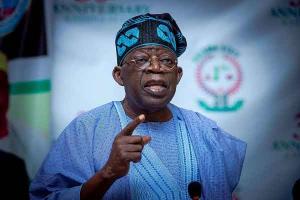
.jpg)

.jpg)
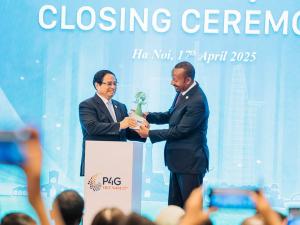
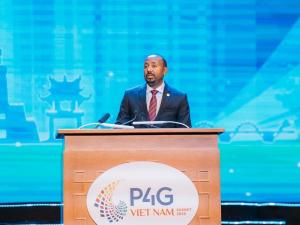
.jpg)

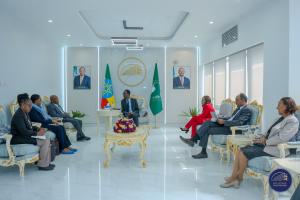
.png)
.png)
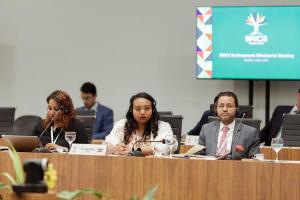
.jpeg)
.jpg)
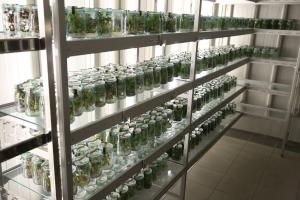
.png)
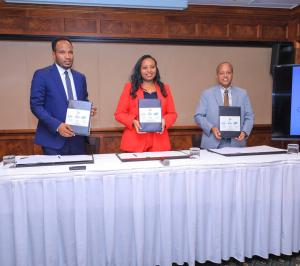
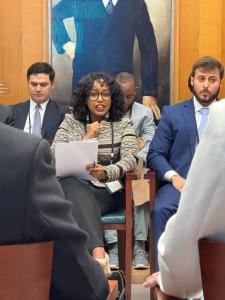
.png)